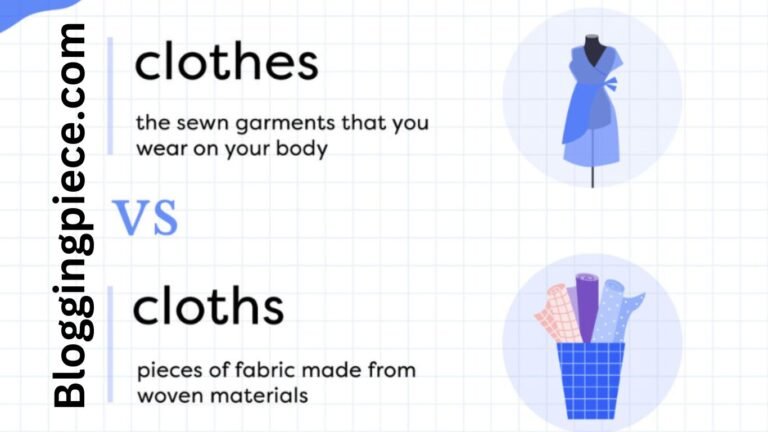Introduction
Spelling can be tricky, and even common words like “clothes” can trip people up. Getting it right is crucial, especially in written communication where first impressions count. Let’s dive into the ins and how do you spell clothes correctly and why it matters.
Understanding the Word ‘Clothes’
Definition of ‘Clothes’
“Clothes” refers to items worn on the body, such as shirts, pants, dresses, and so on. They are essential for daily life, providing comfort, protection, and style.
Origin and Etymology
The word “clothes” comes from the Old English “clāþas,” which is the plural of “clāþ,” meaning cloth or garment. Over time, the spelling and usage have evolved to the form we use today.
Usage in Daily Life
We use “clothes” every day, whether talking about shopping, laundry, or fashion. It’s a staple in our vocabulary, making it all the more important to spell it correctly.
Common Misspellings
‘Cloths’ vs. ‘Clothes’
“Cloths” refers to pieces of fabric, while “clothes” are garments. The missing “e” can change the meaning entirely, so watch out!
‘Cloth’s’ vs. ‘Clothes’
“Cloth’s” is the possessive form of “cloth,” indicating something belonging to the fabric. Adding an apostrophe can confuse things.
‘Close’ vs. ‘Clothes’
“Close” means to shut something, while “clothes” are what you wear. They might sound similar, but their meanings are worlds apart.
Why People Misspell ‘Clothes’
Phonetic Challenges
The pronunciation of “clothes” can be confusing, as it sounds similar to “close” or “cloths,” leading to frequent misspellings.
Typographical Errors
Quick typing can lead to mistakes. A slipped finger might result in “cloths” instead of “clothes.”
Influence of Dialects and Accents
Regional accents can affect how words are pronounced and spelled. Some dialects might pronounce “clothes” without emphasizing the “th” sound, causing confusion.
Tips to Remember the Correct Spelling
Mnemonics and Memory Aids
Think of “clothes” as “clo” plus “thes.” Breaking it down can help remember the spelling.
Pronunciation Practice
Practice saying “clothes” clearly, emphasizing the “th” sound. This can help reinforce the correct spelling in your mind.
Writing Exercises
Write sentences using “clothes” regularly. The more you practice, the more natural it will become.
Spelling ‘Clothes’ in Different Contexts
Formal Writing
In formal writing, accuracy is key. Double-check your spelling to ensure professionalism.
Casual Writing
Even in casual texts or emails, correct spelling makes communication clearer and more effective.
Digital Communication
Auto-correct can help, but don’t rely on it entirely. Proofreading is still important.
Common Phrases and Idioms Involving ‘Clothes’
Examples of Phrases
- “Clothes make the man.”
- “Change of clothes.”
- “In the emperor’s new clothes.”
Meaning and Usage
These phrases highlight the importance and impact of clothes in various contexts, from personal image to storytelling.
Fun Facts About the Word ‘Clothes’
Historical Trivia
In medieval times, clothes were a sign of social status, with laws dictating who could wear what based on their rank.
Cultural References
“Clothes” appear in numerous cultural references, from fairy tales like “The Emperor’s New Clothes” to modern fashion trends.
Exercises to Practice Spelling ‘Clothes’
Spelling Drills
Write “clothes” multiple times in a row. Repetition aids memory.
Sentence Construction
Create sentences using “clothes” in different contexts. This practice reinforces correct usage.
The Importance of Spelling in Professional Communication
First Impressions
Correct spelling creates a positive first impression, showing attention to detail and competence.
Professionalism and Credibility
Accurate spelling is a mark of professionalism, enhancing your credibility in any field.
The Role of Technology in Spelling
Spell Checkers and Grammar Tools
These tools are helpful but not foolproof. Always double-check their suggestions.
Limitations of Technology
Spell checkers might not catch context-specific errors. Human proofreading remains essential.
Frequently Asked Questions About Spelling ‘Clothes’
Common Queries
People often ask about the difference between “clothes” and similar words, highlighting the common confusion.
Expert Answers
Understanding the nuances and practicing regularly can clarify these doubts.
Conclusion
Spelling “clothes” correctly is more than just a matter of accuracy; it’s about clear communication and professional presentation. With practice and attention to detail, you can master it. So, next time you’re writing about your wardrobe, you’ll have one less thing to worry about.
FAQs
1. How can I improve my spelling skills?
Practice regularly, use mnemonic devices, and read widely to expose yourself to correct spelling.
2. What are some common spelling mistakes in English?
Words like “their,” “there,” “they’re,” “your,” and “you’re” often trip people up, as do homophones like “cloths” and “clothes.”
3. How do dialects affect spelling?
Dialects can influence pronunciation, leading to spelling variations. Being aware of these can help mitigate mistakes.
4. Are there any tools to help with spelling?
Yes, tools like spell checkers, grammar apps, and online dictionaries can assist in ensuring correct spelling.
5. Why is correct spelling important?
Correct spelling ensures clear communication, avoids misunderstandings, and reflects professionalism and attention to detail.


